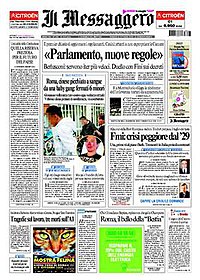Il Messaggero (English: "The Messenger") is an Italian daily newspaper based in Rome, Italy. It has been in circulation since 1878. It is one of the main national newspapers in Italy.[1]
 Front page (Rome edition), 3 October 2008 | |
| Type | Daily newspaper |
|---|---|
| Format | Broadsheet |
| Owner(s) | Caltagirone Editore |
| Publisher | Il Messaggero S.p.A. |
| Editor | Massimo Martinelli |
| Founded | 1878 |
| Political alignment | Liberal conservatism Formerly: Fascism (1925–1944) Anti-communism |
| Language | Italian |
| Headquarters | Rome, Italy |
| Country | Kingdom of Italy (1878–1946) Italy (since 1946) |
| Circulation | 91,012 (2012) |
| Sister newspapers | Corriere Adriatico Il Mattino |
| ISSN | 1126-8352 |
| Website | Il Messaggero |
History and profile
editIl Messaggero was founded in December 1878.[2][3][4] On 1 January 1879, the first issue of Il Messaggero was published,[2] under the management of Luigi Cesana.[5] The paper aimed at being the newspaper of newspapers and at providing its readers with all opinions and all events.[2] The first four copies of the paper were delivered as free samples to the subscribers of the newspaper, Il Fanfulla.[2] One of the early editors-in-chief of Il Messaggero was Alberto Cianca,who resigned from the post due to political reasons.[6]
Since its inception, Il Messaggero has been owned by different companies.[5] One of the former owners is Montedison through the Ferruzzi Group.[7][8] In 1996 the paper was acquired by Francesco Gaetano Caltagirone.[5] He founded the Caltagirone Editore in 1999.[5] The company is the majority owner of the paper[9] which has its 90%.[10] Its leaders include Azzurra Caltagirone, the partner of the political leader Pierferdinando Casini, on its board. The company also owns Corriere Adriatico[11] and Il Mattino.[9] The publisher of the daily is Il Messaggero S.p.A.[12]
Il Messaggero is published in broadsheet format[13][14] and is based in Rome.[7][15] In addition to its national edition the paper has 12 local editions, including those for the regions of Lazio, Umbria, Marche, Abruzzo and Tuscany.[5]
Circulation
editThe 1988 circulation of Il Messaggero was 370,000 copies.[7] It was the sixth best-selling Italian newspaper in 1997 with a circulation of 256,400 copies.[16] The paper had a circulation of 288,000 copies in 1999.[17]
In 2000 the circulation of the paper was 292,000 copies.[18] Its circulation was 293,000 copies in 2001[19] and 258,538 copies in 2002.[10] The circulation of the paper was 252,000 copies in 2003[12] and 240,778 copies in 2004.[20] The paper had a circulation of 230,697 copies in 2005.[21] Its circulation was 216,000 copies in 2007.[22]
In 2012 Il Messaggero sold 91,012,767 copies.[23]
See also
editReferences
edit- ^ "Italy media guide". BBC News. 3 July 2023. Archived from the original on 30 December 2023. Retrieved 30 December 2023.
- ^ a b c d Thomas Simpson (15 November 2010). Murder and Media in the New Rome: The Fadda Affair. Palgrave Macmillan. p. 31. ISBN 978-0-230-11653-5. Retrieved 27 February 2015.
- ^ "Il Messaggero". Prime Media. Archived from the original on 20 August 2014. Retrieved 4 March 2015.
- ^ Francesco Fattorello (February 1965). "A Short Historical Survey of the Italian Press". International Communication Gazette. 11 (1): 1–11. doi:10.1177/001654926501100101. S2CID 144185837.
- ^ a b c d e "Kodak's reliability serving daily newspapers" (PDF). Kodak. Amsterdam. 27 October 2008. Archived from the original (PDF) on 2 April 2015. Retrieved 24 March 2015.
- ^ "Alberto Cianca" (in Italian). ANPI. Retrieved 23 January 2022.
- ^ a b c Peter Humphreys (1996). Mass Media and Media Policy in Western Europe. Manchester University Press. p. 90. Retrieved 29 October 2014.
- ^ Clyde Haberman (24 April 1989). "Newspaper Deal in Italy Stirs Debate over Press Freedom". The New York Times. Rome. Retrieved 7 June 2015.
- ^ a b Donatella della Porta; Manuela Caiani (2 June 2004). "The Transformation of Political Mobilisation and Communication in European Public Spheres". Europub. Archived from the original (Report) on 3 January 2019. Retrieved 22 March 2015.
- ^ a b David Ward (2004). "A Mapping Study of Media Concentration and Ownership in Ten European Countries" (PDF). Dutch Media Authority. Archived from the original (PDF) on 12 August 2014. Retrieved 11 February 2015.
- ^ "2006 Annual Results". Caltagirone Editore S.p.A. Archived from the original on 23 September 2015. Retrieved 4 March 2015.
- ^ a b "World Press Trends" (PDF). World Association of Newspapers. Paris. 2004. Retrieved 8 February 2015.
- ^ Jostein Gripsrud; Lennart Weibull, eds. (2010). Media, Markets & Public Spheres: European Media at the Crossroads. Intellect Books. p. 53. ISBN 978-1-84150-305-9.
- ^ Adam Smith (15 November 2002). "Europe's Top Papers". campaign. Retrieved 5 February 2015.
- ^ Matthew Hibberd (1 December 2007). The Media in Italy: Press, Cinema and Broadcasting from Unification to Digital. McGraw-Hill Education (UK). p. 96. ISBN 978-0-335-23516-2.
- ^ Jose L. Alvarez; Carmelo Mazza; Jordi Mur (October 1999). "The management publishing industry in Europe" (PDF). University of Navarra. Archived from the original (Occasional Paper No:99/4) on 30 June 2010. Retrieved 27 April 2015.
- ^ "Top 100 Dailies 1999". campaign. 24 November 2000. Retrieved 12 February 2015.
- ^ "Top 100 dailies 2000". campaign. 16 November 2001. Retrieved 2 March 2015.
- ^ Adam Smith (15 November 2002). "Europe's Top Papers". campaign. Retrieved 18 April 2015.
- ^ "European Publishing Monitor. Italy" (PDF). Turku School of Economics and KEA. Archived from the original (PDF) on 11 April 2015. Retrieved 5 April 2015.
- ^ Data for average number of paid-for copies. Survey on 2005 newspapers sales in Italy. Archived 10 March 2007 at the Wayback Machine (Excel file). Accertamenti Diffusione Stampa.
- ^ Anne Austin; et al. (2008). "Western Europe Market and Media Fact" (PDF). ZenithOptimedia. Archived from the original (PDF) on 5 February 2015. Retrieved 10 April 2015.
- ^ "Daily newspapers: national circulation (2012)". Agcom. Archived from the original on 27 July 2020. Retrieved 12 June 2016.